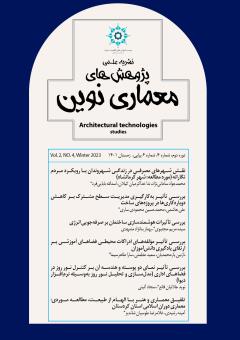بررسی تأثیرات هوشمندسازی ساختمان بر صرفهجویی انرژی
محورهای موضوعی :
سیده مریم مجتبوی
1
![]() ,
بهناز بنانژاد مشهدی
2
,
بهناز بنانژاد مشهدی
2
1 - استادیار گروه معماری، مؤسسه آموزش عالی فردوس، مشهد، ایران
2 - دانشجوی کارشناسی ارشد معماری داخلی، مؤسسه آموزش عالی فردوس، مشهد، ایران.
کلید واژه: ساختمان هوشمند, هوشمندسازی, مصرف انرژی, تکنولوژی, بهینهسازی مصرف انرژی,
چکیده مقاله :
امروزه با پيشرفت تکنولوژی، امکان بهروزرسانی اجزای ساختمان جهت افزایش سطح تعامل انسان و تکنولوژی، تأمین آسایش بيشتر، دستیابی به ایمنی، امنیت، راحتی و کنترل بهتر فضای فراهم شده است. همچنین بحران کمبود انرژی در سراسر جهان به یکی از جدیترین مشکلات بشر تبدیل شده و معماری هوشمند میتواند با کاهش مصرف سوختهای فسیلی، موجب کاهش مصرف برق و گاز، کاهش تولید گازهای گلخانهای و کاهش اثرات مخرب زیستمحیطی شود، به همین دلیل ضروری است که از هوشمندسازی در معماری داخلی بهره برده شود. هدف این پژوهش بررسی تأثیرات استفاده از تکنولوژی در ساختمان و واکاوی تأثیر عناصر هوشمندسازی در بهینهسازی مصرف انرژی است. روش پژوهش حاضر از لحاظ ماهیت، کیفی و از لحاظ هدف کاربردی است. در گام نخست با مرور مبانی نظری و پیشینه تحقیق در حوزۀ هوشمندسازی و بهینهسازی انرژی، اطلاعات از طریق مطالعات کتابخانهای-اسنادی جمعآوری و عناصر هوشمندسازی در قالب مدل مفهومی استخراج شد. در گام بعدی از طریق تحلیل محتوا به بررسی نحوۀ عملکرد مقولهها و زیرمقولههای هوشمندسازی بر کاهش مصرف انرژی پرداخته شد. یافتهها نشان داد، هوشمندسازی یکی از تأثیرات مثبت تکنولوژی در فرایند ساختمانسازی است که از طریق «مواد و مصالح هوشمند»، «حسگرها»، «سامانۀ کنترل ایمنی، امنیت و نظارت» و «تجهیزات خدماتی» میتواند منجر به بهبود مؤلفههای اقتصادی، روانی، کالبدی و زیستمحیطی زندگی ساکنین شود و از دو روش باسیم و بیسیم قابل اجرا است. یکی از مهمترین اثرات هوشمندسازی کاهش مصرف انرژی از مؤلفۀ زیستمحیطی است که نحوۀ عملکرد مقولهها و زیرمقولههای آن در قالب نموداری ارائه شده است.
Today, with the advancement of technology, it is possible to update building components to increase the level of human-technology interaction, provide more comfort, achieve security, safety, comfort and better control in the residential space. Also, the energy shortage crisis around the world has become one of the most serious human problems, and smart architecture can reduce the consumption of fossil fuels, reduce electricity and gas consumption, reduce greenhouse gas production, and reduce harmful environmental effects, for this reason it is necessary to Intelligence should be used in interior architecture. The purpose of this research is to investigate the effects of using technology in the building and the impact of smart elements on the lives of residents, especially in optimizing energy consumption. The present research method is qualitative in nature and practical in terms of purpose. In the first step, by reviewing the theoretical foundations and research background in the field of intelligentization and energy optimization, information was collected through library-documentary studies, analyzed through content analysis, then the elements of intelligentization were extracted in the form of a conceptual model. In the second step, the effects of intelligentization on improving the quality of residents were investigated, and in the last step, the performance of indicators of intelligentization that reduce energy consumption was analyzed. The findings showed that one of the effects of technology on building construction is intelligentization, which through "smart materials and materials", "sensors", "security and safety control system and monitoring" and "service equipment" can improve economic, psychological and physical components. and the environment to improve the quality of life of the residents and it can be implemented by two methods, wired and wireless. One of the most important effects of intelligentization is the reduction of energy consumption from the environmental component, the performance of each of the elements is presented in a diagram.
